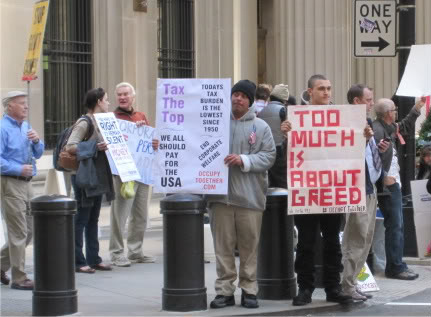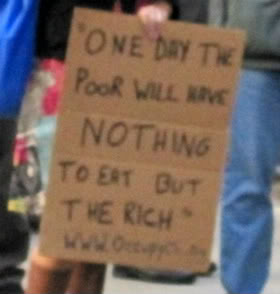meganmonkey
Impressions of an Occupation, Part I: Occupy Chicago – Who and Why
by , 10-10-2011 at 09:35 AM (14722 Views)
I spent 48 hours at Occupy Chicago, including the overnight hours, with the majority of my time spent talking one-on-one or in small groups to other people who were there. Some people were die-hards who were committed to being there as much as possible. Others came by every few days when they had some free time. There were even people who walked by, unaware of the occupation, and decided to stay for hours. The population varied from about a dozen overnight to more than a hundred for the evening march and General Assembly. There were reportedly 300 people the previous Friday night. It is challenging to report solid numbers because people came and went all day long.
Most of the day consisted of people holding signs all over the intersection of Lasalle and Jackson Chicago’s finanical district. Support from passers-by was intense. Cars were honking nonstop as they passed the intersection, from rusty old beaters to Cadillac Escalades. Cab drivers, bus drivers, and truck drivers expressed their wholehearted support. Open-topped double decker buses filled with tourists cheered and waved. It was rare to see a blatantly negative reaction.
I spoke with one college-aged kid who chose not to go to school because of 24% interest loans, and another because a parent lost a job due to medical problems. I spoke to a retirement-aged man who couldn’t afford to stop working despite health issues related to his profession. I spoke to homeless people, working parents, immigrants, dozens of people.
There were people there from a variety of trade unions and the IWW. While I was on the corner with a sign a car pulled up to the curb and the driver handed me his card and said “What do you guys need? We’ll help you in any way we can”. He was from the Teamsters. There is union involvement and this lends the movement credibility.
The common assertion that this is a movement of mostly young white people is wrong. The talking heads deliberately misrepresent the movement in this way to minimize its importance – discontented young white people come along every generation, they go through a phase of rebellion, and then suck it up and join the rat race. To be sure, the young people have the most free time and energy to spend on the corner holding signs, marching and attending meetings so, to some extent, they are overrepresented. But every ethnic group, age, and socioeconomic demographic was well-represented when I was there. This was not necessarily true of the ‘leadership’ of the group in Chicago, however, and I will discuss that in another post.
There is no doubt that the basic premise of the Occupy movement resonates with a wide variety of people, despite the assertions of some that there is no clear message. The basic premise is that the disparity of wealth in this country has reached unacceptable levels and that the government is too tied up with protecting corporate interests rather than the interests and needs of the majority of people. Whether someone is from a traditionally disenfranchised group stuck in a cycle of poverty, or from a ‘comfortable’ middle-class background that is becoming less comfortable, the people out there simply get it.
The discontent among the American working class and underclass has been lurking under the surface for a long time. The fact that people are finally saying these things out loud, gathering in groups, and realizing that they are not alone in their struggles and frustration is very powerful. The US media and partisan political machine have done an incredible job at keeping the concrete economic issues out of the conversation for a very long time. But reality is getting harder to deny – low wages, layoffs, foreclosures, high health care costs, and failing infrastructure are louder than the talking heads.
While there seemed to be consensus on the basic premise mentioned above, there were many differing views on the details – how we got here, what needs to be changed, and how radical this change must be. I was pleasantly surprised at the number of people who spoke in straight terms that capitalism is the problem, but they were still the minority. Many people seemed to hold onto the idea that significant change can come from reforming or regulating capitalism through legislation and elections.
There was also clear disagreement among people on social and cultural issues that aren’t tied directly to the economy. What was impressive, however, was the near-universal understanding that those issues are secondary to the purpose of the movement.
There is no overall, shared ideology. Some see this as a fatal flaw of the movement. But trying to state a firm ideology now would be counterproductive; at this point, many people barely have the language to talk in concrete terms about basic economic realities. For a few generations in the US we have held capitalism up as a symbol of freedom and democracy, using abstract terms that represent ideals that are far removed from reality. Dissenting voices are few and far between. It is very difficult for most people to even conceive of a different economic system, or a movement that does not revolve around a political party (despite the historical evidence that successful movements are politically independent from the ruling class parties).
Many supporters of the movement need to re-evaluate the myths about the ideals of our ‘Founding Fathers’, the so-called freedom and democracy of a global capitalist economy, and the history of real social change in our country and in the world. There are far too many cries about ‘getting our country back’, for example. Back to what? And what about the rest of the world?
The 99% in the US are lacking class consciousness and organization, and the Occupy movement is starting some very important conversations in this regard. We have to start somewhere and rekindle the spirit of independent, class-based direct action. There is an opportunity in this, and rather than letting the usual opportunists, bourgeois organizations, and partisans crush the potential of this movement early on, we would be better off getting out there, talking and listening, and even participating in the meetings and organization, helping people unlearn the lies they’ve been fed and start to make crucial connections. There is a long road ahead of us. As I see it, Occupy isn’t going to get us to the end of the road, but it may help get us pointed in the right direction.





 Email Blog Entry
Email Blog Entry

